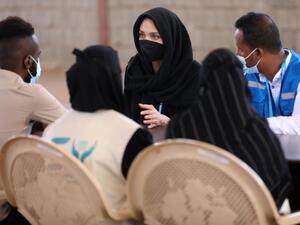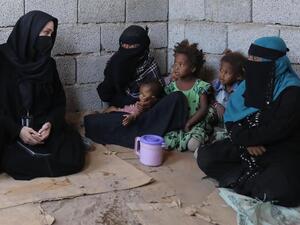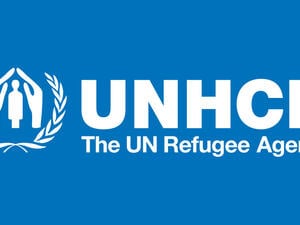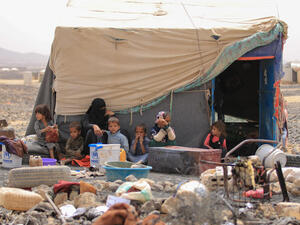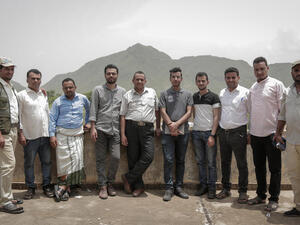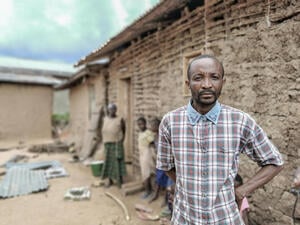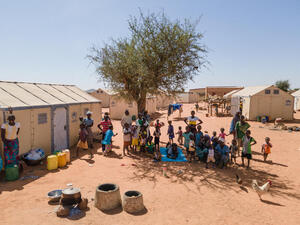UNHCR calls for more protection for civilians fleeing Yemen's Al Hudaydah
UNHCR calls for more protection for civilians fleeing Yemen's Al Hudaydah

Displaced by fighting in Al Hudaydah, Ali Mohammed and his family are sheltering in a school the Yemeni capita Sana'a,
UNHCR, the UN Refugee Agency, is ramping up its response to meet the most urgent protection needs of thousands of families displaced by the fighting in Al Hudaydah, the strategic port city through which 80 percent of all food and aid arrives into Yemen. The offensive to capture the city began in June and has resulted in the displacement of over 50,800 families according to OCHA. UNHCR is calling on all parties to ensure the physical safety of civilians and their freedom of movement and to guarantee safe routes for civilians to leave conflict areas.
The conflict has escalated significantly over the past 3 months, in particular in Al Hudaydah governorate. According to the Civil Impact Monitoring Report, over 450 civilians have lost their lives in Yemen in the first nine days of August alone, making it one of the deadliest periods since the start of the conflict in March 2015. Since then, a total of 6,600 civilians have been killed in Yemen and 10,563 have been injured, according to the Office of the United Nations High Commissioner for Human Rights (OHCHR).
During focus group discussions with displaced persons from Al Hudaydah conducted in June and July, UNHCR identified a series of protection needs requiring urgent attention. Most prominent among them are the specific needs of children who may be separated from their families, and women, who may be at high risk of sexual harassment and violence either during flight or when living in overcrowded settings. Another common concern is the loss of livelihoods, exacerbated by a decline in purchasing power due to increasing food prices and the decline in value of the Yemeni currency, the riyal.
UNHCR, in coordination with partners, is carrying out in-depth protection monitoring assessments for displaced families in order to identify the most vulnerable and ensure access to protection and referral to specialized services. Over 11,500 displaced families (over 70,000 people) have been assessed country-wide, leading to the provision of a wide range of assistance, including multipurpose cash, rental subsidies and referrals to specialised services.
Vulnerable cases have been referred to UNHCR’s Community Centres in Al Hudaydah, Ibb and Sana’a, where UNHCR and partners provide many services, including psychosocial counselling and support, and legal assistance, including help to obtain national IDs which are crucial for accessing services.
The conflict in Yemen is also affecting refugees and asylum-seekers. UNHCR and partners face significant challenges in ensuring a safe environment, adequate protection, humanitarian assistance and access to essential, life-saving services for refugees who may be vulnerable to serious protection concerns such as early marriage, child labour, increased detention and dangerous onward movement, as the crisis has impacted on their resilience and livelihoods.
Yemen hosts over 270,000 refugees, the vast majority of whom (over 256,000) are Somalis. Despite the challenging security environment which makes humanitarian access difficult, UNHCR has continued to help refugees and asylum-seekers in Al Hudaydah governorate. Most of them are Eritreans. They are particularly vulnerable because of the tense situation and changing frontlines and who have limited flight options available to them. Since 2017, UNHCR has also helped 2,135 Somali refugees to return to Somalia through its Assisted Spontaneous Return programme with IOM.
Yemen is currently the worst humanitarian crisis in the world with some 22 million people, 75 per cent of the population, requiring some form of humanitarian assistance and protection. UNHCR is concerned for the civilian population impacted by the conflict, in particular the estimated 2.3 million displaced persons and over one million returnees, as well as the 270,000 refugees and 10,000 asylum seekers in Yemen. To help protect the rights of those forced to flee, UNHCR continues to call on all parties to the conflict to adhere to international humanitarian law, international human rights and refugee law.
For more information on this topic, please contact:
- In Yemen, Amira Abdelkhalek, [email protected], +967 712 225 070
- In Geneva, William Spindler, [email protected], +41 79 217 30 11

